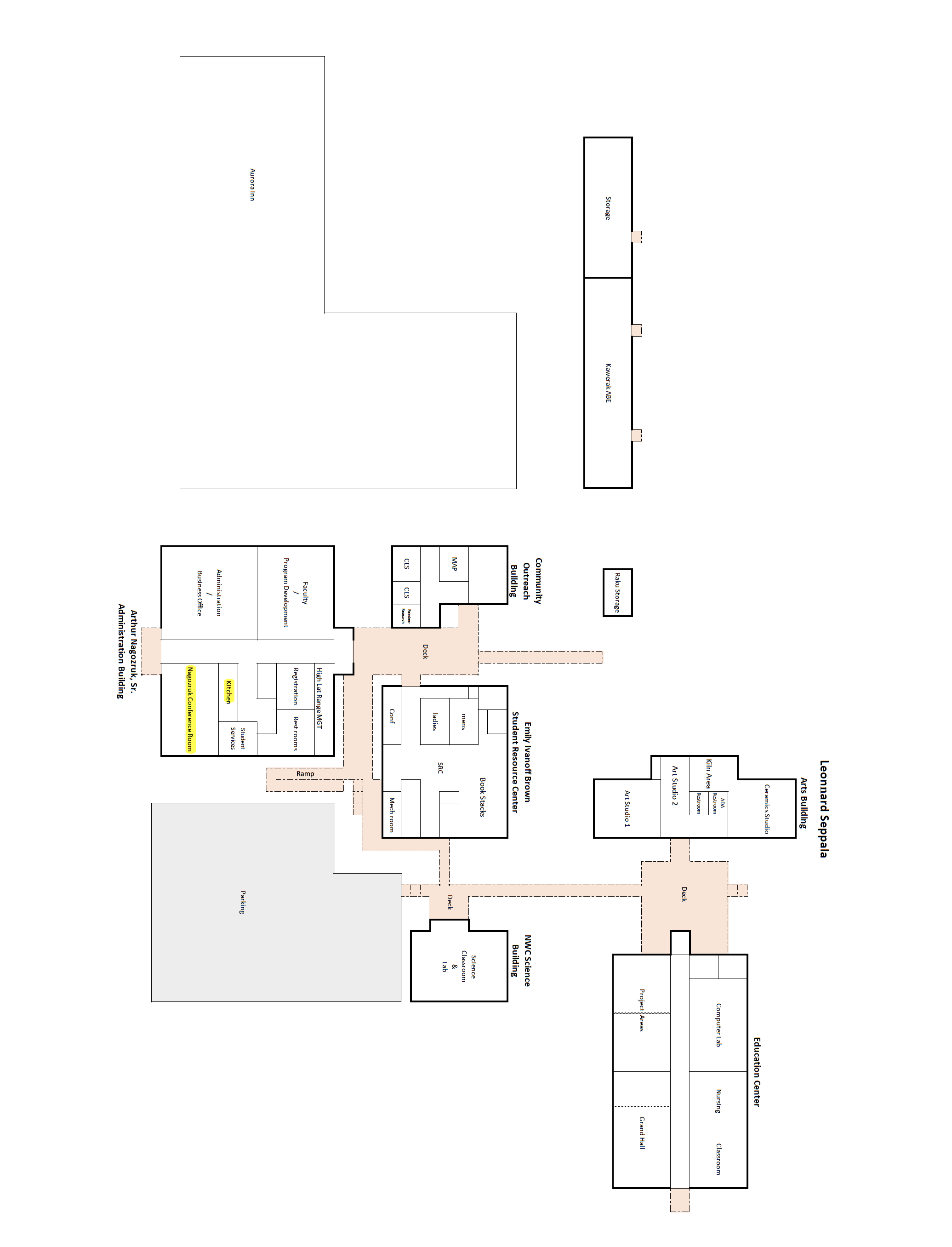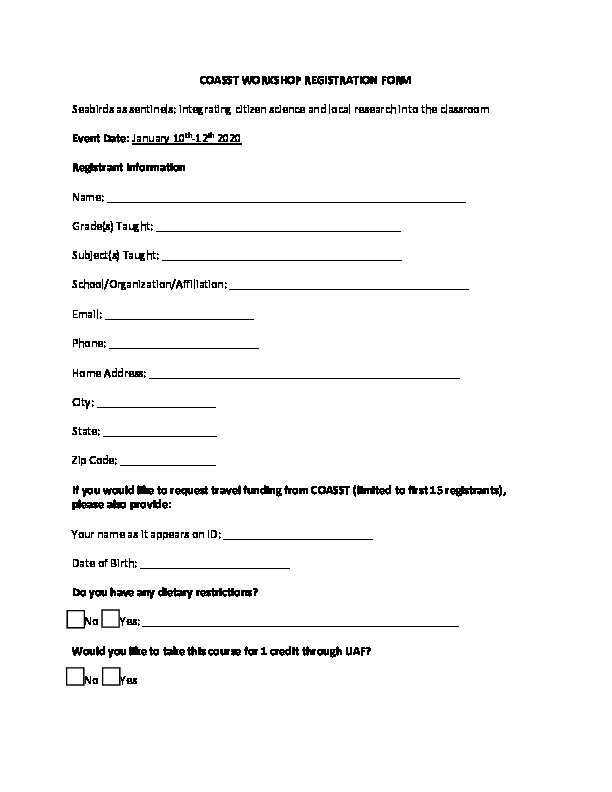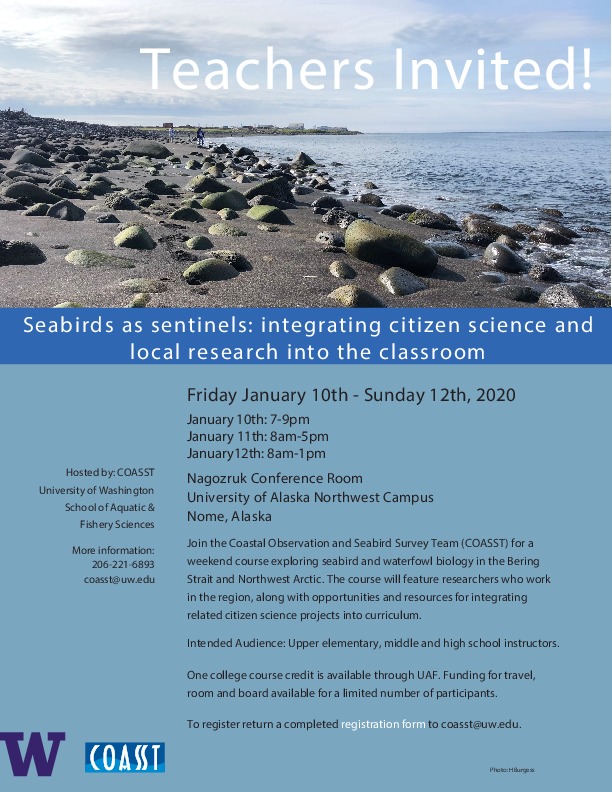Seabirds as sentinels: integrating citizen science and local research into the classroom
Join the Coastal Observation and Seabird Survey Team (COASST) for a weekend course exploring seabird and waterfowl biology in the Bering Strait and Northwest Arctic. The course will feature researchers who work in the region, along with opportunities and resources for integrating related citizen science projects into curriculum.
Teachers Invited!
Who: Upper elementary, middle, and high school instructors in the Bering Strait and Northwest Arctic regions
When: Friday January 10th – Sunday January 12th, 2020
Where: Nagozruk Conference Room, UA Northwest Campus, Nome (AK)
Workshop Topics
- Intro to seabird and waterfowl biology and natural history of the region, with examples of local research activities and results, including COASST but also colony-based work, resource management agency efforts
- Intro to citizen science as a science teaching tool, with connections to a network of communities of practice and relevant resources
- Exploration of seabird related activities and ready-made curriculum
- Intro to culturally relevant information about subsistence use and co-management
- COASST workshop activity, with links to Alaska Science Standards
- Discussion of process for tribal consultation if teachers would like to initiate beached bird data collection in their community, and informed consent if students to be involved
How to sign up
The January workshop registration deadline is December 12th
Please let us know that you would like to attend by filling out our Registration Form. Teachers in the Bering Strait school district should return this form to Karen Beranek, kberanek@bssd.org. All others may return it to coasst@uw.edu.
Contact COASST coordinators Jackie or Hillary at coasst@uw.edu with any questions and travel arrangement needs
Workshop Goals
This workshop was developed in response to teacher inquiries to COASST about getting involved in beach monitoring and engaging students in this effort. The weekend is designed around the following goals:
- Provide an opportunity for educators to learn about local seabird and waterfowl natural history, research, subsistence use and management happening in the communities they serve
- Share tools for teachers to integrate citizen science, and COASST surveys specifically, into their curriculum
- Connect educators to people who study, manage, and use seabirds, waterfowl and habitats in their communities
- Determine the support and resources needed to implement COASST in schools
Links and Resources
-

Campus Map – January 2020 -

Registration Form – December 2019 -

Flyer – December 2019
Instructors

Robb Kaler

Robb Kaler
Robb is a wildlife biologist at USFW’s Migratory Bird office, based in Anchorage, AK.

Alexis Will

Alexis Will
Alexis Will is a post-doctoral research fellow at the National Institute of Polar Research in Japan, and a research scientist at the Institute of Arctic Biology, University of Alaska Fairbanks. She works with an international team of researchers studying how seabirds respond to changes in their environment. Currently they are exploring how seabirds breeding in the Northern Bering Sea interact with sea ice during the non-breeding period to understand how changes in sea ice extent may impact seabird distributions in the future.

Jim Pfeiffenberger

Jim Pfeiffenberger
Jim Pfeiffenberger is a long time informal educator, having worked at places such as the Pacific Science Center, Olympic National Park, and the Alaska SeaLife Center in the past. He is currently the Education Coordinator at the Ocean Alaska Science and Learning Center, a program of the National Park Service based in Seward, Alaska.

Lupe Zaragoza

Lupe Zaragoza
Guadalupe Zaragoza is the Visual Information Specialist at Bering Land Bridge National Preserve. What she loves most about her job is the marriage between nature and media. Often the two seem to be on opposite ends of the spectrum, but creating media products about the natural world creates a harmonious balance.
Agenda
All workshop activities take place in the Nagozruk Conference Room UA Northwest Campus (just next door to the Aurora Inn)
We know that some folks are arriving around 7pm on Friday. Please have the taxi drop you off at the UA campus and join us as soon as you can. Same with departures on Sunday.
| FRIDAY JANUARY 10th 7-9pm | Instructor | TIME |
| Dinner provided | ||
| Introductions while eating | Hillary/Jackie, All | 7:00 PM |
| Icebreaker | Jim | 7:30 PM |
| Subsistence traditions and co-management: seabirds and people are connected | Brandon | 8:00 PM |
| SATURDAY JANUARY 11th 8am-5pm | ||
| Breakfast and lunch provided during workshop, RSVP for dinner | ||
| Refreshments and settling-in | 8:00 AM | |
| Citsci Intro: people and science are connected | Hillary | 8:15 AM |
| What do people already do that is seabird or citsci related? | Jim | 8:30 AM |
| Seabird biology and natural history of region (seabirds as ecosystem indicators) | Alexis, Robb | 9:00 AM |
| Seabird research on St. Lawrence Island & teacher resources | Alexis | 9:45 AM |
| BREAK | 10:00 AM | |
| Foraging game | Alexis | 10:15 AM |
| NPS research and management in region | Nikki | 10:30 AM |
| USFWS Migratory Birds management and research in the region | Robb | 10:45 AM |
| Seabird die-offs, COASST intro DOA/Monthly Surveys | Hillary | 11:15 AM |
| Reflection | Jim | 11:30 AM |
| LUNCH | 12:00 PM | |
| COASST training | Jackie/Hillary | 1-5 PM |
| SUNDAY JANUARY 12th 8am-1pm | ||
| Breakfast and lunch provided during workshop | ||
| Refreshments and settling-in | 8:00 AM | |
| Population game | Jim/Lupe | 8:15 AM |
| COASST data activities | Hillary | 9:00 AM |
| Carcass collection | Robb | 9:15 AM |
| In small groups outline a plan for bringing resources presented (COASST, curriculum, content) to teaching. What additional resources are needed? Report out. | Jim | 9:30 AM |
| BREAK | 10:00 AM | |
| All together reflect on the resources, information and steps needed to implement COASST surveys in teaching, including potential barriers and challenges. Next steps. | Jim | 10:15 AM |
| Tribal consultation, informed consent: ethics of data collection and community involvement | Hillary/Jackie | 11:00 AM |
| Evaluations, UA Paperwork, wrap-up | Hillary | 11:30 AM |
| LUNCH | 12:00 PM |



